Kultur in Gefahr - ITI
Kultur in Gefahr - ITI
Kultur in Gefahr - ITI
You also want an ePaper? Increase the reach of your titles
YUMPU automatically turns print PDFs into web optimized ePapers that Google loves.
34 Artistic Expression <strong>in</strong> a Corporate World<br />
Artistic Expression <strong>in</strong> a Corporate World 35<br />
enhance cultural diversity; someth<strong>in</strong>g similar to the Convention on<br />
Biodiversity.<br />
Actually, three drafts are circulat<strong>in</strong>g for such a Convention on<br />
Cultural Diversity. One comes from Sagit, a Canadian association of<br />
cultural enterprises. The second orig<strong>in</strong>ates from a cultural NGO, the<br />
International Network for Cultural Diversity, and the third draft was<br />
composed by the International Network on Cultural Policy (INCP), an<br />
association of more than fifty m<strong>in</strong>isters of culture from all parts of the<br />
world. This last draft will, without doubt, be the ma<strong>in</strong> source for Unesco<br />
when draft<strong>in</strong>g its own text for a Convention on Cultural Diversity. It is not<br />
the purpose of this chapter to discuss and compare these three exist<strong>in</strong>g<br />
drafts separately. It is more the <strong>in</strong>tention to analyse what issues are at<br />
stake <strong>in</strong> conceptualis<strong>in</strong>g such a framework of rules. 7<br />
Before do<strong>in</strong>g this, it is necessary not to raise false hopes and expectations.<br />
Therefore we have to look <strong>in</strong> the direction of the 1969 Vienna Treaty on<br />
the Law of Conventions. This treaty discusses how <strong>in</strong>ternational<br />
conventions that operate <strong>in</strong> (nearly) the same field relate to each other. It<br />
says that the first convention on the same matter has priority. In the case<br />
of culture it means this. As we have seen before, <strong>in</strong> December 1993 culture<br />
has become part of GATS, the WTO treaty on trade and services. A new<br />
<strong>in</strong>ternational treaty, like a Convention on Cultural Diversity may <strong>in</strong>tend to<br />
br<strong>in</strong>g culture out of the dispute settlement procedure of WTO, and may try<br />
to safeguard countries that regulate their cultural market from trade<br />
retaliations. Nevertheless, the US may wish to claim that this is impossible,<br />
because all the obligations of WTO have priority above a new Convention<br />
on Cultural Diversity.<br />
Does this mean that the establishment, and all the preparatory work,<br />
of such a Convention on Cultural Diversity would not make sense? Not at<br />
all. Firstly, one could make the argument that there already is someth<strong>in</strong>g<br />
like an <strong>in</strong>ternational legally b<strong>in</strong>d<strong>in</strong>g <strong>in</strong>strument <strong>in</strong> the same field that dates<br />
from the years prior to culture hav<strong>in</strong>g been sneaked <strong>in</strong>to GATS. This is the<br />
Universal Declaration of Human Rights from 10 December 1948, which is of<br />
course more important than any imag<strong>in</strong>able trade treaty. One may argue<br />
that countries did not have the right to pilot culture <strong>in</strong>to the port of WTO<br />
and its services treaty. Why not? The Universal Declaration of Human<br />
7 This chapter has been based on Bernier 2000; Bernier 2002; Ruiz Fabri 2003;<br />
Wiedemann, 2002; the drafts of the Convention on Cultural Diversity of Sagit,<br />
INCD, and INCP; and papers from and discussions dur<strong>in</strong>g the conference of The<br />
Comité de vigilance sur la diversité culturelle, Paris, 2, 3, 4 février 2003.<br />
Rights guarantees that everybody should have access to the means of<br />
communication. The WTO treaties however, open the possibility for this<br />
right to be denied, and so it happens.<br />
Thus, the claim might be that the Universal Declaration of Human<br />
Rights came first, and so the WTO does not have the right to deal with<br />
culture. A Convention on Cultural Diversity, however, derives its legal<br />
status directly from the Universal Declaration of Human Rights. It would<br />
give states (<strong>in</strong>clud<strong>in</strong>g the regional and local adm<strong>in</strong>istrative levels) the right<br />
to regulate markets <strong>in</strong> such a way that access to the means of cultural<br />
communication is open to as many people as possible. It would also take<br />
care that the cultural life from any community will not be taken over by<br />
absent landlords, as we have def<strong>in</strong>ed cultural <strong>in</strong>dustries. A Convention on<br />
Cultural Diversity would make concrete the aims of the Universal<br />
Declaration of Human Rights. So, there is a direct l<strong>in</strong>k between these two<br />
<strong>in</strong>ternational <strong>in</strong>struments. The WTO, however, is an aberration that does<br />
not fit <strong>in</strong>to this l<strong>in</strong>e.<br />
The second reason why it makes sense to cont<strong>in</strong>ue to work on a<br />
Convention on Cultural Diversity comes from the Doha M<strong>in</strong>isterial<br />
Declaration from 14 November 2001, that started a new Round of trade<br />
liberalisation (<strong>in</strong> disorder however, s<strong>in</strong>ce its mid term September 2003<br />
meet<strong>in</strong>g <strong>in</strong> Cancún). Its Article 31 demands that the relation between<br />
treaties <strong>in</strong> the fields of trade and environment must be scrut<strong>in</strong>ized,<br />
concretely of course between WTO and the Convention on Biodiversity.<br />
It might be clear that here the same problem exists as between WTO and a<br />
future Convention on Cultural Diversity. What has priority? It seems that<br />
there exists a Work<strong>in</strong>g Group on trade and environment, but there is huge<br />
secrecy on its membership, its agenda and its possible results. This may<br />
not amaze because this undemocratic way of work<strong>in</strong>g is commonplace <strong>in</strong><br />
the WTO, and therefore the organization may be compared with the former<br />
Soviet Union.<br />
The question of cultural diversity is also <strong>in</strong>volved <strong>in</strong> the conflict<br />
that several develop<strong>in</strong>g countries like Brazil and India put on the agenda<br />
on the consequences of the TRIPs agreement (the WTO treaty on so<br />
called Trade Related Aspects of Intellectual Properties) for susta<strong>in</strong><strong>in</strong>g the<br />
Convention on Biodiversity. The purpose of this convention is the<br />
protection of ecological diversity and concern for susta<strong>in</strong>able<br />
development. Therefore, the convention says that states have the<br />
sovereign right to protect their genetic resources, traditional knowledge<br />
and the use of it <strong>in</strong> a susta<strong>in</strong>able manner; tak<strong>in</strong>g any measures they



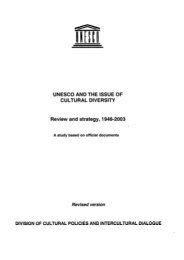

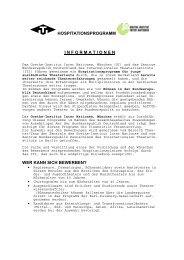

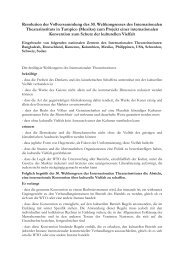
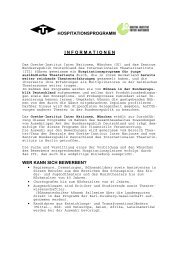
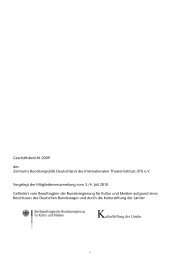
![Geschäftsbericht 2010 [pdf 2 MB] - ITI](https://img.yumpu.com/4380475/1/184x260/geschaftsbericht-2010-pdf-2-mb-iti.jpg?quality=85)